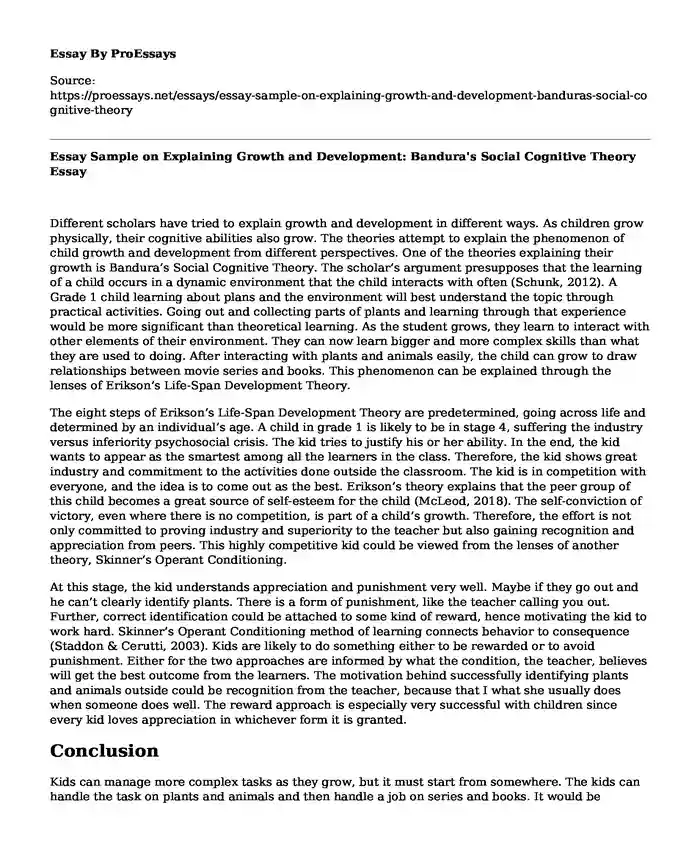Different scholars have tried to explain growth and development in different ways. As children grow physically, their cognitive abilities also grow. The theories attempt to explain the phenomenon of child growth and development from different perspectives. One of the theories explaining their growth is Bandura’s Social Cognitive Theory. The scholar’s argument presupposes that the learning of a child occurs in a dynamic environment that the child interacts with often (Schunk, 2012). A Grade 1 child learning about plans and the environment will best understand the topic through practical activities. Going out and collecting parts of plants and learning through that experience would be more significant than theoretical learning. As the student grows, they learn to interact with other elements of their environment. They can now learn bigger and more complex skills than what they are used to doing. After interacting with plants and animals easily, the child can grow to draw relationships between movie series and books. This phenomenon can be explained through the lenses of Erikson’s Life-Span Development Theory.
The eight steps of Erikson’s Life-Span Development Theory are predetermined, going across life and determined by an individual’s age. A child in grade 1 is likely to be in stage 4, suffering the industry versus inferiority psychosocial crisis. The kid tries to justify his or her ability. In the end, the kid wants to appear as the smartest among all the learners in the class. Therefore, the kid shows great industry and commitment to the activities done outside the classroom. The kid is in competition with everyone, and the idea is to come out as the best. Erikson’s theory explains that the peer group of this child becomes a great source of self-esteem for the child (McLeod, 2018). The self-conviction of victory, even where there is no competition, is part of a child’s growth. Therefore, the effort is not only committed to proving industry and superiority to the teacher but also gaining recognition and appreciation from peers. This highly competitive kid could be viewed from the lenses of another theory, Skinner’s Operant Conditioning.
At this stage, the kid understands appreciation and punishment very well. Maybe if they go out and he can’t clearly identify plants. There is a form of punishment, like the teacher calling you out. Further, correct identification could be attached to some kind of reward, hence motivating the kid to work hard. Skinner’s Operant Conditioning method of learning connects behavior to consequence (Staddon & Cerutti, 2003). Kids are likely to do something either to be rewarded or to avoid punishment. Either for the two approaches are informed by what the condition, the teacher, believes will get the best outcome from the learners. The motivation behind successfully identifying plants and animals outside could be recognition from the teacher, because that I what she usually does when someone does well. The reward approach is especially very successful with children since every kid loves appreciation in whichever form it is granted.
Conclusion
Kids can manage more complex tasks as they grow, but it must start from somewhere. The kids can handle the task on plants and animals and then handle a job on series and books. It would be difficult to get development from the sophisticated side heading to the less complex, as that would defy the theories of growth and development entirely. The progress in development does not happen by accident, as deliberate steps are occurring in life that enforces the child’s growth. Erikson’s Life-Span Development, Skinner’s Operant Conditioning, and Bandura’s Social Cognitive Theory all reveal the presence of a growth pattern experienced by everyone in their growth trajectory. When a teacher clearly understands the stage of the learners’ growth, they can carefully select an approach through which to undertake lessons.
References
McLeod, S. (2018). Erik Erikson’s Stages of Psychosocial Development. Simplypsychology.org. Retrieved 4 July 2020, from https://www.simplypsychology.org/Erik-Erikson.html.
Schunk, D. (2012). Social cognitive theory. APA Educational Psychology Handbook, Vol 1: Theories, Constructs, And Critical Issues., 101-123. https://doi.org/10.1037/13273-005
Staddon, J., & Cerutti, D. (2003). Operant Conditioning. Annual Review Of Psychology, 54(1), 115-144. https://doi.org/10.1146/annurev.psych.54.101601.145124.
Cite this page
Essay Sample on Explaining Growth and Development: Bandura's Social Cognitive Theory. (2023, Sep 17). Retrieved from https://proessays.net/essays/essay-sample-on-explaining-growth-and-development-banduras-social-cognitive-theory
If you are the original author of this essay and no longer wish to have it published on the ProEssays website, please click below to request its removal:
- Paper Example on Impact of Technology on Child Development
- Change to Make at My College Essay
- Paper Example on Chaining to Teach a Functional Self-Help Skill to a Child With Autism
- Character Strengths in Adolescents Essay Example
- Essay on Applying the Social-Ecological Model to Solve Childhood Obesity
- Essay on Adolescent and Young Adult Addiction: Impact of Age on Human Behavior
- Essay on The Melvin's Study: The Final Factor That Led Parents to Raise Children the Way They Did







